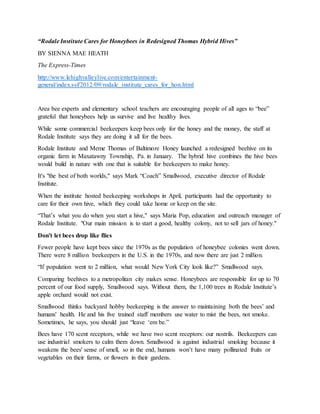
9-9-12 Rodale Institute cares for honeybees in redesigned Thomas hybrid hives
- 1. “Rodale Institute Cares for Honeybees in Redesigned Thomas Hybrid Hives” BY SIENNA MAE HEATH The Express-Times http://www.lehighvalleylive.com/entertainment- general/index.ssf/2012/09/rodale_institute_cares_for_hon.html Area bee experts and elementary school teachers are encouraging people of all ages to “bee” grateful that honeybees help us survive and live healthy lives. While some commercial beekeepers keep bees only for the honey and the money, the staff at Rodale Institute says they are doing it all for the bees. Rodale Institute and Meme Thomas of Baltimore Honey launched a redesigned beehive on its organic farm in Maxatawny Township, Pa. in January. The hybrid hive combines the hive bees would build in nature with one that is suitable for beekeepers to make honey. It's "the best of both worlds," says Mark “Coach” Smallwood, executive director of Rodale Institute. When the institute hosted beekeeping workshops in April, participants had the opportunity to care for their own hive, which they could take home or keep on the site. “That’s what you do when you start a hive," says Maria Pop, education and outreach manager of Rodale Institute. "Our main mission is to start a good, healthy colony, not to sell jars of honey." Don't let bees drop like flies Fewer people have kept bees since the 1970s as the population of honeybee colonies went down. There were 8 million beekeepers in the U.S. in the 1970s, and now there are just 2 million. “If population went to 2 million, what would New York City look like?” Smallwood says. Comparing beehives to a metropolitan city makes sense. Honeybees are responsible for up to 70 percent of our food supply, Smallwood says. Without them, the 1,100 trees in Rodale Institute’s apple orchard would not exist. Smallwood thinks backyard hobby beekeeping is the answer to maintaining both the bees’ and humans' health. He and his five trained staff members use water to mist the bees, not smoke. Sometimes, he says, you should just “leave ‘em be.” Bees have 170 scent receptors, while we have two scent receptors: our nostrils. Beekeepers can use industrial smokers to calm them down. Smallwood is against industrial smoking because it weakens the bees' sense of smell, so in the end, humans won’t have many pollinated fruits or vegetables on their farms, or flowers in their gardens.
- 2. Ethne Clarke, Editor-in-Chief of Organic Gardening magazine, published by Rodale, Inc., is a frequent visitor of Rodale Institute. “The Rodale Institute with the focus on science is a constant source of inspiration," Clarke says. "Bees are so critical to the health of a garden." Alison Panik, a fifth grade teacher at Seven Generations Charter School, who developed a unit on honeybees for her students, says that planting pollination-friendly plants in backyard gardens will help bees to pollinate fruits and vegetables. Bees for People Children are at the forefront for many bee workshops. “The younger generation is a little more aware,” says Megan Kintzer, director of communications and development at Rodale Institute. “There’s a big push to educate on environmental issues.” Panik teaches science through so-called "system thinking," which helps her fifth graders become problem solvers with the understanding that all ecosystems interlock. When the charter school’s hive swarmed and left half of its population frozen in time, it made her students wonder why. Now that they have two new hives, which arrived in April from Texas, she and her students decided not to let them swarm this time. Swarming, as Panik and her students recognized, is a natural process and a way that honeybee colonies reproduce. More than half of the worker bees will leave the original hive location with the old queen in a relatively large swarm and relocate to a new spot. “They feel that they are solving important problems in the world,” Panik says. “Even the kids that aren’t the strongest readers want to go after this information.” Thomas also sees the importance of educating children on the lives of bees. “[We are] reaching out to the youth and widening their eyes to the bees’ connection to the world,” she says. Bee careful Tips for kids to "bee safe" Fifth grade teacher Alison Panik, of Seven Generations Charter School in Emmaus, wants her students and all children to “bee safe” by following these tips: Buy local honey. Support bees and keep them healthy so they can pollinate fruits and vegetables at local farms. Plant a vegetable garden. Plant a butterfly bush, even though it is not a native plant. Plant clover and let it grow. A big lawn with no clover is like a desert for bees. Do not plant invasive plants.
- 3. Do not use pesticides. Don’t wear perfume around bees. They may not want to sting you, but they are very territorial. Know that bees are not the enemy. Bees are your friend. They are partners in a system that help us survive. Smallwood encourages wannabe-beekeepers to wash hands with alcohol and wear white protective gear. While the honeybees do not intend to sting anyone, they are very territorial. If you get stung, Smallwood suggests chewing plantains and making a paste for the sting. “They’re not looking to sting anybody; they’re looking for nectar,” says Smallwood. "Usually when you think you are stung by a bee, you are stung by a wasp or hornet, not a honeybee, he says. Before building your own hive, visit rodaleinstitute.org for resources or plan to attend the April session. The hands-on workshops cost $1,000 for participants to experience beekeeping with the Thomas hybrid hive. If you go The Rodale Institute is open to the public 10 a.m. to 4 p.m. Tuesdays through Saturdays and noon to 4 p.m. Sundays. The institute's beehives, livestock, organic gardens and more are located at 611 Siegfriedale Road in Maxatawny Township, Pa. For more information, call 610-683-1400 or visit rodaleinstitute.org.